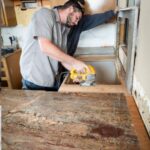
Engineered Stone Fabrication: Unveiling Hidden Hazards
July 3, 2024
Silica Exposure and Lung Health in Artificial Stone Workers: New Insights
July 16, 2024Background and Objective
The artificial stone benchtop industry has surged in popularity due to the aesthetic appeal and cost-effectiveness of its products. However, the preparation and installation of these benchtops release respirable crystalline silica (RCS), which can cause silicosis, a preventable yet incurable lung disease. This study, conducted by Fiona Hore-Lacy and colleagues, aimed to assess mental health among workers in this industry who are at risk of silicosis, focusing on predictors of psychological stress.
Methods
The study included 547 workers undergoing assessment for silica-associated diseases. Data collected encompassed demographics, occupational and medical history, smoking habits, dyspnoea levels using the modified Medical Research Council (mMRC) dyspnoea scale, Perceived Stress Scale (PSS-10) scores, spirometry, and chest X-rays. Both univariate and multivariate regression analyses were performed to identify stress predictors.
Key Findings
1. Demographics and Stress Levels
The majority of participants were men under 45 years old, with less than 10 years in the industry. Higher PSS-10 scores, indicating greater perceived stress, were observed in those who had left the industry, had a history of anxiety or depression, attended assessments early in the program, and had medium exposure durations.
2. Dyspnoea as a Predictor
Each increase in dyspnoea score was associated with higher PSS-10 scores. This relationship remained significant even after adjusting for factors such as age, sex, smoking status, history of anxiety or depression, and interpreter use. This suggests that the distress caused by breathlessness is a significant contributor to stress.
3. Role of Employment Status
Workers who had left the artificial stone benchtop industry reported higher stress levels compared to those still employed in the industry. This may reflect the financial and psychological burdens faced by those unable to continue working due to health issues.
4. Impact of Mental Health History
A past or present diagnosis of anxiety or depression was a strong predictor of elevated stress. Participants referred for further assessment also reported higher stress levels, highlighting the psychological impact of potential health diagnoses.
5. Interpreter Use and Stress
Interestingly, participants who used an interpreter during the assessment reported lower stress levels. This may suggest that language barriers, when appropriately managed, do not exacerbate stress and might indicate effective communication during assessments.
6. Lack of Association with Clinical Markers
There was no significant difference in stress levels across various job titles, age groups, smoking statuses, spirometry results, or chest X-ray categories after multivariate analysis. This indicates that clinical markers alone are not sufficient predictors of stress.
Discussion
The study identified dyspnoea, employment status, and mental health history as significant predictors of stress among silica-exposed workers. The findings emphasize the need for comprehensive health assessments that consider both physical and psychological factors. The distress caused by breathlessness (dyspnoea) was particularly notable, suggesting that interventions aimed at managing dyspnoea could also help reduce stress.
Implications for Workplace Health Programs
1. Enhanced Support for High-Risk Workers
Workers experiencing dyspnoea, those who have left the industry, and those with a history of mental health issues may require additional support and targeted interventions to manage their stress levels effectively.
2. Integrated Health Assessments
Regular health assessments should incorporate both physical and psychological evaluations to identify workers at risk of elevated stress. This holistic approach can help in early detection and management of both silicosis and its associated mental health impacts.
3. Language and Cultural Sensitivity
The use of interpreters and culturally sensitive materials can help reduce stress among non-native speakers, ensuring effective communication and understanding during health assessments.
4. Proactive Mental Health Interventions
Given the high levels of stress associated with anxiety, depression, and leaving the industry, proactive mental health support and counseling services should be integral to occupational health programs.
Conclusion
The study by Hore-Lacy et al. highlights the multifaceted nature of stress among silica-exposed workers in the artificial stone benchtop industry. By identifying key predictors of stress, the research underscores the importance of integrated health assessments and targeted support interventions to enhance the overall well-being of these workers.
A Comprehensive Approach
This comprehensive approach to understanding and managing psychological stress in the workplace can help improve both health outcomes and quality of life for those at risk of silicosis in the artificial stone benchtop industry. As the industry continues to grow, prioritizing the mental health of workers alongside physical health measures will be crucial in mitigating the long-term impacts of silica exposure.
Protect Your Health from Workplace Negligence – Brayton Purcell LLP
If you or someone you know is facing mental or physical health issues potentially related to artificial stone silicosis, it's crucial to seek expert legal advice. The silica exposure attorneys at Brayton Purcell LLP specialize in advocating for workers exposed to hazardous materials, including silica from artificial stone benchtops.
Our silicosis victim lawyers are committed to ensuring that you receive the support and compensation you deserve. Do not wait for symptoms to worsen; contact Brayton Purcell LLP today for a consultation and take the first step towards securing your future.
Call (800)361-2417 today to discuss your case with a stone cutter lung injury attorney.
References
- Hore-Lacy, F., Hansen, J., Dimitriadis, C., Hoy, R., Fisher, J., Glass, D., & Sim, M. R. (2024). Predictors of psychological stress in silica-exposed workers in the artificial stone benchtop industry. Occupational and Environmental Medicine.














